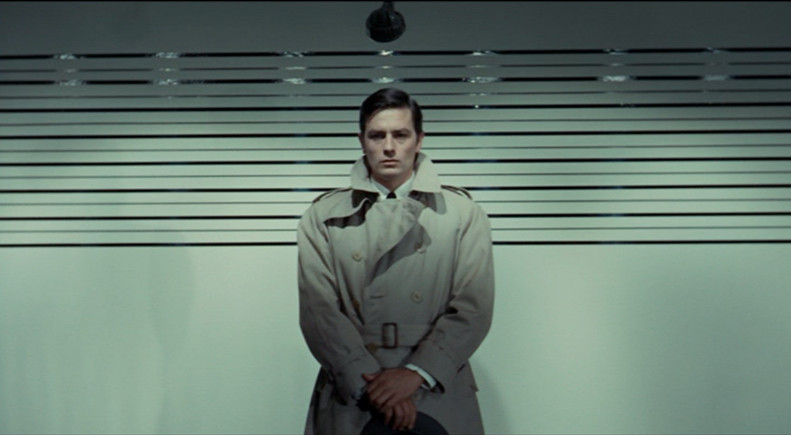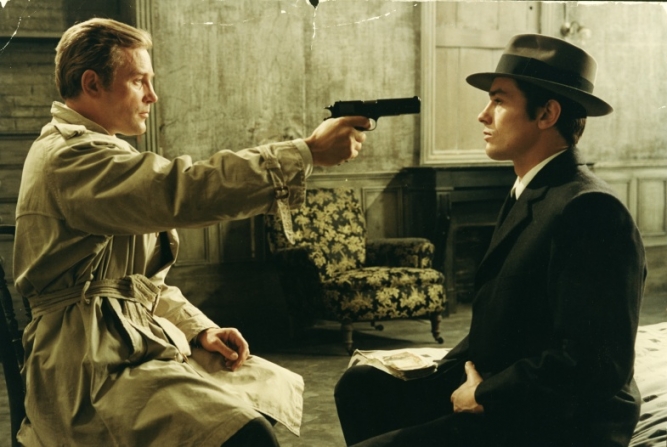
“Melville is God to me… [Le Samouraï is] the closest to a perfect movie that I have ever seen.”
– John Woo
Being and nothingness
In a taut and lean 100 minutes Jean-Pierre Melville somehow manages to condense and distill 30 plus years of gangster movies, police procedurals, and film noir into an astonishing existential tenor with Le Samouraï.
Melville opens the film with an on-screen preface which reads: “There is no greater solitude than that of the samurai unless it is that of the tiger in the jungle… perhaps…” A source is given for this allegorical excerpt, the Bushido Book of the Samurai, but such a tome doesn’t really exist, it’s of Melville’s invention.
And this mention of Japanese culture is the only inference to be found in the entire film and it’s precisely enough to give Le Samouraï a timeless, transcendental, and storied breath. Stylized to the point of exaggeration, the film is an astonishing work wherein the fancied cinematic terrene tramples reality underfoot with a breathtaking corollary.
“Jean-Pierre Melville is the greatest director… I have [had] the privilege of working for.”
– Alain Delon
Jefrey with one f

Considering Melville’s cool approach, the bemused, breathless meditation on solitude, seclusion, and violence, it really isn’t any wonder that Le Samouraï has influenced numerous films and filmmakers, ranging from Jim Jarmusch’s Ghost Dog: The Way of the Samurai (1999), Walter Hill’s The Driver (1978), Nicolas Winding Refn’s Drive (2011), John Woo’s The Killer (1989)––not to mention being regularly cited by Paul Thomas Anderson and Quentin Tarantino, who’ve regularly requisitioned Le Samouraï as the sacred writ of all things cool.
Alain Delon (Purple Noon, The Leopard) is icy cool perfection as Jef Costello, a methodical, amoral and hard-boiled hitman with a penchant for white gloves, who carries out a contract kill on a nightclub owner.
Jef is usually very elaborate and careful on the job but this time around not even his lover Jane’s (Nathalie Delon) impenetrable alibi will be enough to get him by when a witness to the killing, the club’s piano player Valérie (Cathy Rosier), and a determined investigating officer (François Périer) further complicate matters.
Jef soon realizes he’s been set up and bird-dogged, and the police are after him with what little evidence they have. Jef moves from hunter to hunted as the fuzz and crime syndicates want him. There’s some similarity here, in this atypical genre plot, to Jacques Tourneur’s 1947 film noir classic Out of the Past––Robert Mitchum’s troubled gumshoe and Delon’s assassin even share the same name––both rooked and in need of reclamation.
“It is difficult to see how this story could be better accomplished. It has all the best virtues of American film noir but with a European sensibility.”
– Derek Malcolm, The Guardian
Notes from underground

While Tourneur was no doubt a filmmaker that Melville sought to pastiche in Le Samouraï there is perhaps a greater ascendancy from minimalist master and patron saint of cinema Robert Bresson.
So much of Le Samouraï is formal, sequences unravel with no dialogue as the actors themselves posture and pretense like high fashion models, and the soundtrack centers seriously on isolated sounds, deliberately intensified for dramatic effect. And Jef, at the crux of it all as austere as Bresson’s country priest or as artfully disciplined as La Salle’s pickpocket, and similarly moved by forces almost divine.
There’s also an air of Greek tragedy that whips through Le Samouraï, the hero has an unavoidably tragic fate that is elegiac and lyrical and also, sadly, very lonely.
“Like a painter or a musician, a filmmaker can suggest complete mastery with just a few strokes. Jean-Pierre Melville involves us in the spell of Le Samouraï before a word is spoken. He does it with light: a cold light, like dawn on an ugly day. And color: grays and blues. And actions that speak in place of words.”
– Roger Ebert
A wolf among wolves

Jean-Pierre Melville (1917-1973) was born in Paris with the surname Grumbach but renamed himself after his favorite American novelist. His vision of Paris in Le Samouraï––and this is also true of other films of his such as Bob le Flambeur (1956), Le Doulos (1963), and Le Cercle Rouge (1970), amongst others––is refined through an American film noir lens. Nightclubs dedicated to jazz and bad consciences, hairtrigger lawmen, and shadowy streets wet with rain.
This exhilarating fantasia of filmic reality is tempered by Melville’s eye for detail. Jef and the shady, disparate figures in his orbit gesture and move through Paris in means that have been impeccably plotted, on courses meticulously steered. Melville’s obsessive attention to technicality make the police procedural aspects of the film, especially the intricate surveillance sequences, all the more impelling. So much of Le Samouraï is soaked in with the eyes and then extraordinarily felt in the gut.
In Le Samouraï a heady mixture of male machismo, unsated violence, and uneasy dogma becomes balladry, lucid reverie, and the very expression of cool.
Author Bio: Shane Scott-Travis is a film critic, screenwriter, comic book author/illustrator and cineaste. Currently residing in Vancouver, Canada, Shane can often be found at the cinema, the dog park, or off in a corner someplace, paraphrasing Groucho Marx. Follow Shane on Twitter @ShaneScottravis.